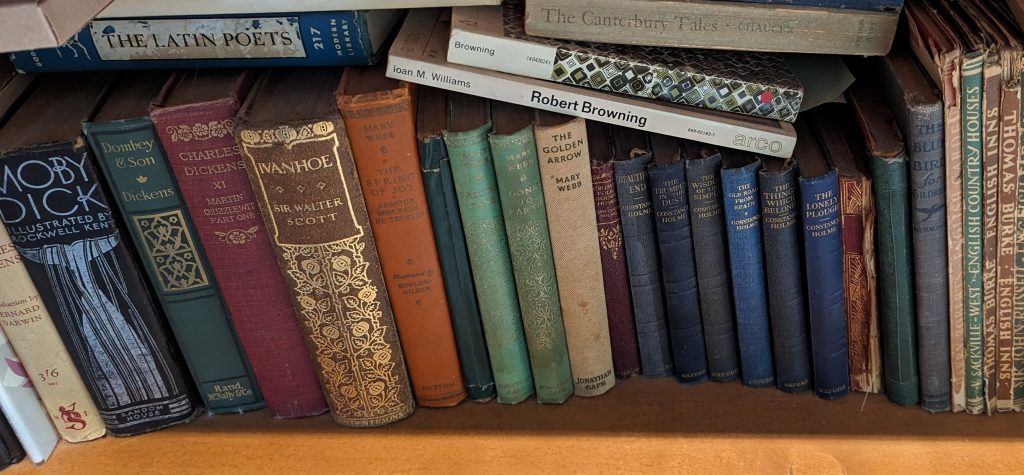Summer Reading

At long last it was summer, and, free of school, I could spend more of my time happily lost in books of my own choosing. Remembering that sweet time, my thoughts turn to my father and his splendid library.
Like Goethe, my artist father was convinced that in the best teaching the mind is lured, so that learning becomes no martyrdom but sheer delight. Many times, this luring meant leaving improving books lying about where I could hardly fail to notice them. But all too often, the urge to share his excitement overcame his discretion and he lost me by lecturing in a badgering sort of way. Inevitably I barely listened to him because I had a perverse need to stand apart. This meant that I usually made it a point to explore his bookshelves when he was away at work.
All the same, although I wouldn’t have admitted that to him in those days, my father’s books were meat and drink to me, friends and teachers where I had few. Housed on an ever-growing assemblage of shelves was everything I could ever want, and much, much more.
Thinking back, what strikes me now is that in my father’s library, where books were packed two layers deep, with extra copies crammed in the spaces on top, there was a beauty no longer is easy to buy. Row upon row of splendid bindings, were displayed, not out of a wish for swank, but as his tribute to the printed word and the artistry housing it. Lined up along the higher shelves there also were ranks of blue and orange Penguin and Pelican paperbacks. (Even then I loved the title Thinking to Some Purpose.) Stuffed in were Montaigne, Hume, Alfred North Whitehead, Hillaire Belloc, H.G. Wells’ The Outline of History, Anna Karenina, and George Bernard Shaw’s brilliant, thought-provoking The Intelligent Woman’s Guide to Socialism and Capitalism. (Improbably, this was the book with which my father had successfully courted my beautiful mother.)
Of less interest to me were How to Understand the Weather, First Aid Bandaging Techniques, The Worst Journey in the World, Chrome Yellow (Did he choose that because he was an artist, I wondered) and Japanese woodblock prints bound in silk. (Always there also were several copies of his favourite Cranford, usefully available to be given out to any of his friends who would accept one.)
At nine I had discovered Jane Eyre, a lifelong companion to be reread almost every year. (Looking back, I think it was Jane’s defiant standing up for herself and her principles which kept me coming back.) Perhaps, and most often of all, I turned to L.M. Montgomery, particularly her Emily books about a girl growing up to be a writer. (Already I knew that this was what I would do.) But I also laughed over some of E.B. White’s essays, Jeeves, which seemed deliciously rational to me and Farley Mowat’s The Dog Who Wouldn’t Be”. On other days I drowned in the evocative coastal vision of long ago Maine in Sarah Orne Jewett’s evocative The Country of the Pointed Firs. I also felt a sense of homecoming when I read Hardy, at least until I came upon tragic Tess of the Durbervilles. Sometimes, as when I read Modern Classics translations of De Maupassant, I was burned by frightening intimations of a risky sexual world of which I then knew nothing. Similarly, although I adored the romance of a translated version of Dumas’ La Dame Aux Camelias, I wept bitterly at its ending. So often it was the unfairness of it all that hurt me most.
***
However, for all my delight in the books I found for myself, there was an occasional day when I floundered. Although it could be risky to involve my quixotic, passionate father, I found myself appealing to him in a complaining sort of voice:
“I haven’t got anything to read.”
My father quivered. (When I think of him, he so often was quivering). Asking for his guidance was the greatest gift I could give him, but also was risky because I knew he would get carried away. Exhausted as he must surely have been at the end of his long day, he immediately dropped what he was doing and led me on an expedition together. By the time I was fourteen, the books on the home-made shelves were two layers deep, with others crammed on top.
Only my father knew for sure where the books were in his odd, but fully reasoned cataloguing system. By myself, I foraged in my own small fields, possibly the large, illustrated volumes of The Swiss Family Robinson and Robinson Crusoe, or the photography annual of portraits of dogs, but he knew where everything was. There is a special savor to seeing what books someone else will choose for you. For the sheer pleasure of hearing him sell them to me, I let him pull out twenty or thirty prospects from the tightly packed shelves. The lilting Welshness in his voice became rounder as he lured me with Great Expectations, Tarka the Otter, Two Little Savages, Coming of Age in Samoa, The Bible as Literature, and, possibly, Ecclesiastical Polity.
On and on we went, with my father drawing out and blowing dust off one book after another until “Ken,” my mother appealed. It was past late and she was tired and ready for bed. “Coming, Mother,” he said, so deep in pursuit of the ideal book that I knew there was absolutely no hope of his coming any time soon. A ripe hour later, we descended the stairs, each carrying a chin-high pile of books that I “might like to have a look at.” And even then, at the bottom turn of the stairs he wavered and took one hand to draw out a last prize like an arrow from a quiver, “You know, what you really should look at is this…”